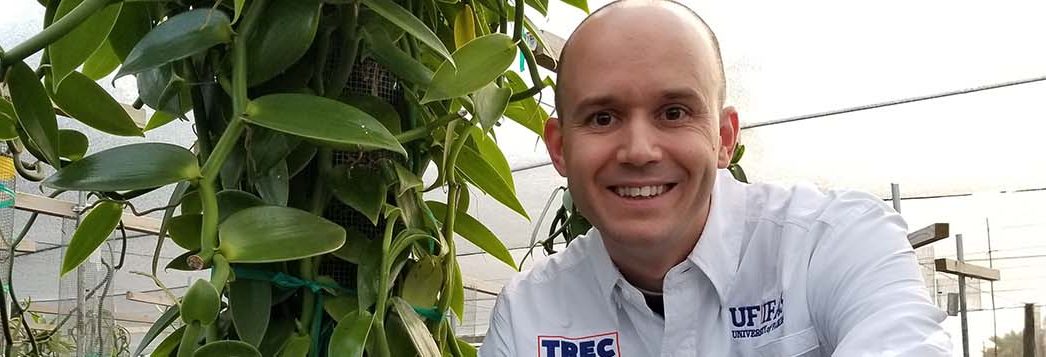USDA Grant To Enhance UF/IFAS Vanilla Research, Promote Domestic Industry
from UF/IFAS
by Lourdes Mederos
A tropical fruit breeder with UF’s Institute of Food and Agricultural Sciences (UF/IFAS) is a step closer to establishing a domestic vanilla industry for growers in Florida, Hawaii and Puerto Rico.
Alan Chambers, an assistant professor and plant geneticist at UF/IFAS Tropical Research and Education Center (TREC) has been awarded a $300,000 grant from the U.S. Department of Agriculture’s National Institute of Food and Agriculture to foster a domestic vanilla production industry.
“A major component of this grant is to advance our work with growers, scientists and residents,” said Chambers. “Vanilla has the potential to be among the highest grossing agricultural commodities and could revitalize some of our distressed agricultural industry.”
Chambers and his team at UF/IFAS TREC also hope to help solve problems that prevent domestic vanilla cultivation.
“This grant helps us communicate cutting-edge information to growers and helps the information be made widely available,” said Chambers. “We will also be able to expand the impact of our previous vanilla breeding and genomics research at UF/IFAS.”
Madagascar leads the world in vanilla production, supplying more than 80% of the world’s vanilla, with Indonesia, Uganda, India, Comoros, Mexico, and other countries significantly contributing to global production. The United States is the biggest importer of vanilla beans from Madagascar and, once in America, those beans are further processed into vanilla extract. As a spice, it is the second most expensive and is the world’s most popular flavor.
“Domestic growers can certainly profit from such a high-value crop like vanilla,” said Chambers. “We hope that this grant will also help us connect with vanilla researchers in North, Central and South America so we can leverage biological diversity to improve this species.”
 Over the last five years, Chambers has generated various vanilla genomics and diversity studies looking at hundreds of vanilla types. He has a collection of more than 300 vanilla types from around the world. He has worked with local and global growers, other scientists and partners in his efforts to identify the best types, traits, variations and yield potentials for Florida.
Over the last five years, Chambers has generated various vanilla genomics and diversity studies looking at hundreds of vanilla types. He has a collection of more than 300 vanilla types from around the world. He has worked with local and global growers, other scientists and partners in his efforts to identify the best types, traits, variations and yield potentials for Florida.
/// Read Full Article ///


